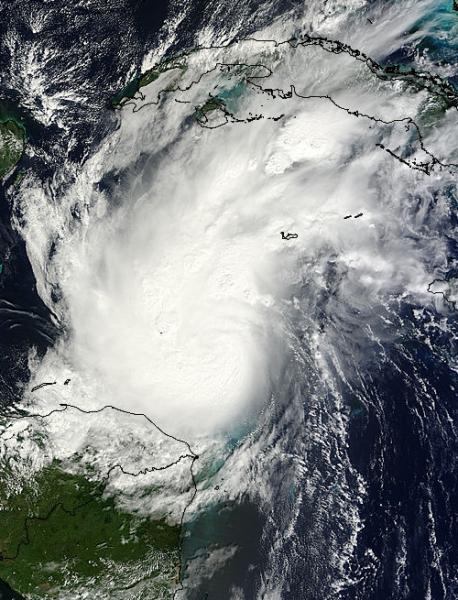Busy hurricane season leaves Cayman in peace
 CNS): Despite this year’s Atlantic hurricane season being as busy as predicted by forecasters the Cayman Islands escaped the season unscathed and free from threats. Between 1 June and 30 November nineteen tropical cyclones rumbled across the Atlantic but most of them stayed clear of the local area. There were two major hurricanes during the 2011 season including Hurricane Rina which was the most significant for the Cayman Islands. While it was still a tropical depression some 200 miles south of Grand Cayman Rina stirred up the oceans along the south coast in October.
CNS): Despite this year’s Atlantic hurricane season being as busy as predicted by forecasters the Cayman Islands escaped the season unscathed and free from threats. Between 1 June and 30 November nineteen tropical cyclones rumbled across the Atlantic but most of them stayed clear of the local area. There were two major hurricanes during the 2011 season including Hurricane Rina which was the most significant for the Cayman Islands. While it was still a tropical depression some 200 miles south of Grand Cayman Rina stirred up the oceans along the south coast in October.
On 24 October the depression became a tropical storm and later that same day a hurricane. As Rina moved slowly to the northwest the Cayman Islands National Weather Service issued severe weather bulletins as it started to affect the local area with rough seas, gusty winds and several inches of rain. As it moved past Grand Cayman, large swells began to impact the south and west coasts. Waves breached the coastal road in parts of George Town and along the West Bay Road. Traffic was diverted as crews from the National Roads Authority worked to clear the road of sand and debris.
Meanwhile, the hurricane season which was described by experts as a study in contradictions made its mark on the US Eastern seaboard where Irene devastated parts of the coast with deadly flooding. Irene was one of the costliest storms in American history and killed at least some 55 people in the Caribbean and North America
The season produced the third-highest number of tropical storms on record but only a slightly higher-than-average number of hurricanes, with six. National Hurricane Centre Director Bill Read said low pressure systems on the East coast and high pressure systems over the central U.S. created favourable steering currents that kept the storms mostly churning far out to sea.
Hurricane Ophelia was the strongest storm of the season, at one point strengthening to a Category 4 with 140 mph winds when it was just northeast of Bermuda. Ophelia hit southeastern Newfoundland, Canada, as a tropical storm, but caused little damage.
As the season drew to a close Wednesday evening weather watchers were still on alert at the NHC as weak area of low pressure located about 200 miles northeast of the northern Leeward Islands offered a slim 20 per cent chance of becoming a tropical cyclone. In Cayman on Wednesday evening the weather was cool and fresh with local forecasters calling for periods of cloudiness with fresh northerly winds and rough seas.
For Cayman the most significant development of the 2011 Hurricane Season was the retirement of Deputy Governor Donovan Ebanks who has spearheaded Cayman’s disaster co-ordination plans for nearly three decades. "It is the end of an era with the departure of Mr. Ebanks," said HMCI Director, McCleary Frederick, "He has been the champion of disaster risk reduction and a calm, rational leader in times of crisis. His leadership is appreciated and will be missed."
Ebanks played a critical role in developing Hazard Management Cayman Islands and the disaster risk reduction capacity of the Cayman Islands. For many years he chaired the National Hurricane Committee and then took over leadership of the National Hazard Management Council. Ebanks was at the helm during Hurricane Ivan, one of the greatest natural disasters in Cayman's recorded history.
Category: Science and Nature


Cloud seeding if you care to watch.Since Katrina 2005.
http://www.youtube.com/watch?v=x8Zk6CyNL9o
Don't count your chickens just yet.
In the UK they still have a severe drought and many areas only just had the first frost of the winter – maybe things are just running a bit late this year?
blessed be the name of the Lord Jesus
Holding breathe for insurance premium reductions! Ha!